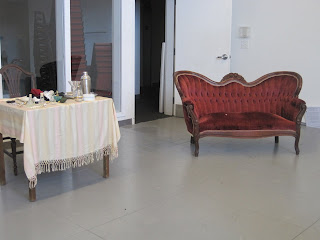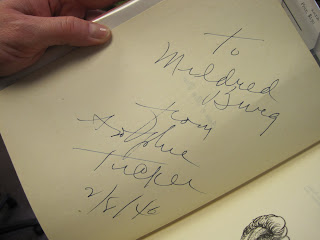by Jack Craib
New Rep Reviewer
Mark this reviewer down as one of those dazed, or better yet dazzled, audience members fortunate enough to have attended the party of the year. That would be New Rep’s final production of its current season, and Artistic Director Kate Warner‘s final directorial effort of her initial season, namely “Sophie Tucker: The Last of the Red Hot Mamas”. This work, described elsewhere as a musical revue, premiered at Sarasota’s Florida Studio Theater, developed by its Artistic Director Richard Hopkins and Jack Fournier, along with Kathy Halenda, who first created the title role. It has been given a full-throttled treatment in the person of its present titular star, Mary Callahan (and her Musical Director and accompanist, Todd C. Gordon). Many stars can belt; few can do so with such purity of voice and clarity of diction.
This two-act show resembles less a revue than it does a private gathering of the most intimate friends of this self-described forty-something queen of vaudeville and burlesque days. Her repertoire of songs, many of them having earned signature status, is interspersed with her naughty and bawdy punch lines and verbal sparring with Mr. Gordon as her foil. While many of the songs (and jokes, it must be noted) betray their vintage, Callanan’s delivery and timing consistently manage to hit the mark. If Ms. Tucker’s sexual innuendos and double entendres seem a bit tame by today’s more liberal standards, the narrative tying the numbers together not only provides historical perspective for her astounding success, but also reveals her pioneering stage persona to be still relevant today. Any number of past and current stand-up comediennes and female cabaret performers owe at least part of their success to the lady in question.
The party begins with several Tucker standards (the title song, then “A Good Man is Hard to Find”) which lead to others (“There’ll Be Some Changes Made”, “After You’ve Gone”) that frame her brief allusions to her three failed marriages. Her evolution (or more correctly, revolution) led to more powerful and poignant revelatory songs (“Life Begins at Forty”, “Living Alone and I Like It”). Perhaps the most revealing and moving turn is the beautifully-rendered “Yiddishe Momme” wherein the star shares her life-long need for her mother’s love and validation. It was her mother’s conviction that her daughter was strong enough, without demonstrative love, that paradoxically made her the powerhouse she became.
Attention must be paid to the incredibly supportive role of Mr. Gordon at the piano, including his verbal contributions and constant in-character presence; attention must be paid to such a man. Nor should the technical credits be overlooked: the simple scenic design (by Joseph O‘Dea), the lighting design (by John Malinowski) and costume design (for both performers, by Frances Nelson McSherry), all of which add up to a seamless recreation of this bygone era.
By the end of the evening, star and audience have become bosom buddies, so to speak; Ms. Tucker and Ms. Callanan take no prisoners. And that, of course, is precisely as it should be. What a fabulous way to cap the season!





 Mary
Mary 

